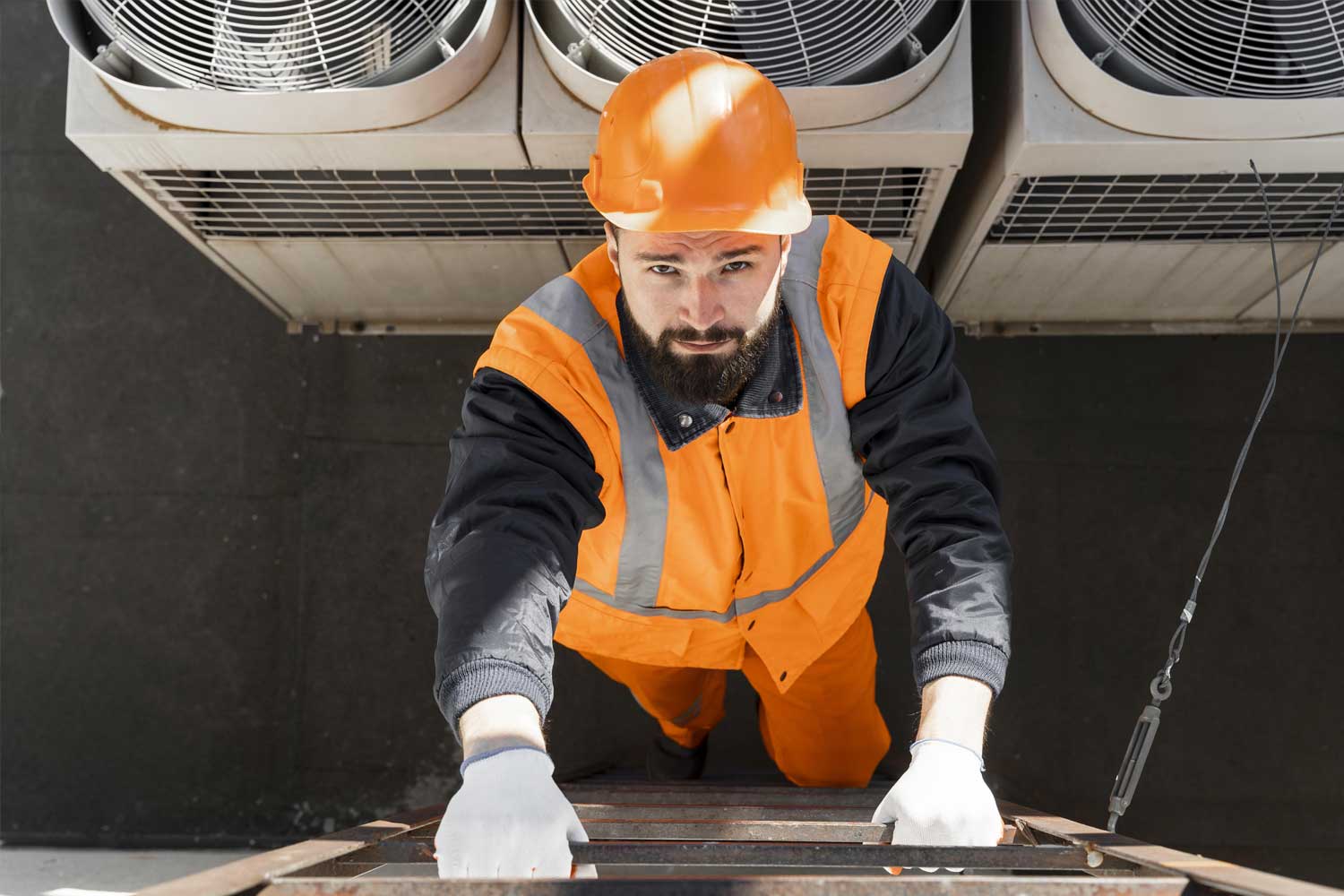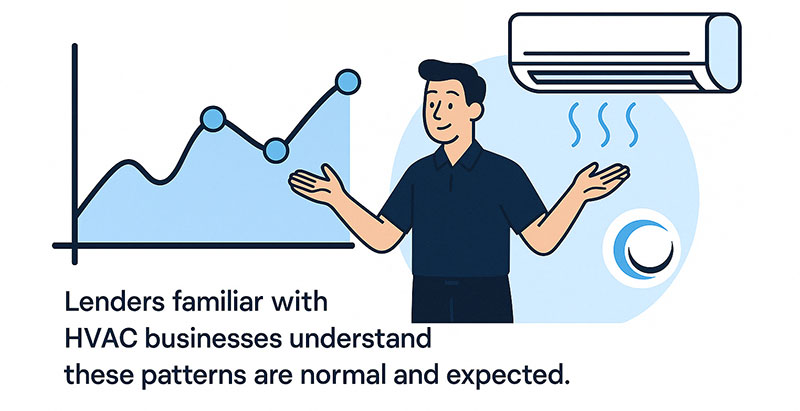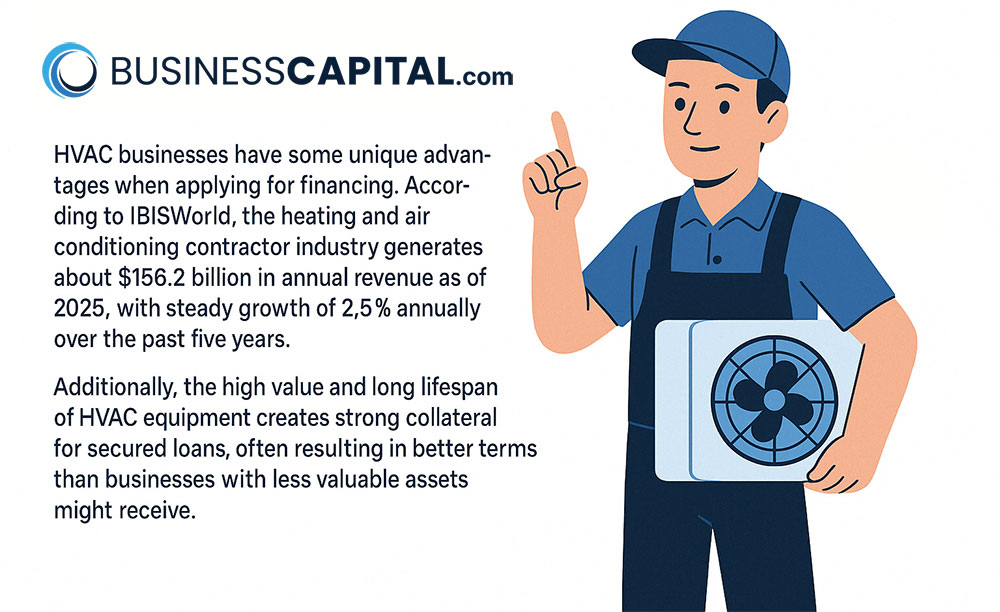By using our website, you agree to the use of cookies as described in our Cookie Policy
Ready to apply for business funding?
Start our simple online application now.

Running an HVAC business comes with its own special brand of financial headaches. One minute you're swamped with emergency calls during a summer heatwave, the next you're staring at an empty schedule during those awkward "shoulder seasons" when nobody's thinking about their heating or cooling systems.
And let's not even get started on equipment costs. That shiny new diagnostic system you've been eyeing? The fleet of service vehicles that desperately need upgrading? They don't exactly come with budget-friendly price tags.
Money shouldn't be the thing holding back a skilled HVAC contractor from growing their business. That's where HVAC business loans come in - not as a last resort when cash gets tight, but as a strategic tool to help your business weather seasonal swings and make those big-ticket investments that set you apart from competitors.
If you're considering financing for your HVAC company, you probably have questions. How much can you borrow? What will lenders want to see? And most importantly - what makes HVAC business loans different from generic business financing?
Let's cut through the confusion and break down exactly what you need to know before applying for funding that's actually built for the unique business needs of the heating and ventilation world.
Let's talk numbers for a second. The HVAC industry isn't just growing - it's booming. According to a recent report from Research and Markets, the U.S. Residential HVAC Market was valued at $15.4 billion in 2024 and is projected to reach a whopping $31.4 billion by 2034. That's a 7.5% annual growth rate, which is pretty impressive for any industry.
But here's the thing about running an HVAC business - growth costs money. Lots of it.
Think about what you're dealing with daily. Those commercial-grade heat pumps? They can easily run $10,000+ each. A well-equipped service van? Another $50,000 gone before you've even added your logo to the side. And don't get me started on the diagnostic equipment that seems to need upgrading every time manufacturers release new system models.
Then there's the seasonal roller coaster that every HVAC contractor knows all too well. July and August? Your phone's ringing off the hook with emergency AC calls. January? Furnace repairs keep your team working overtime. But those peaceful spring and fall months? That's when cash flow gets tight and you're scrambling to keep your best technicians on payroll.
Banks and traditional lenders often don't get these industry-specific challenges. They see the gaps in your revenue and get nervous, not understanding that's just the natural pattern of the HVAC world. This disconnect is exactly why specialized financing options for HVAC businesses have become so critical.
Smart HVAC company owners aren't just using financing as a lifeline during slow periods - they're leveraging it strategically to smooth out those seasonal dips, invest in growth during slower months, and position themselves to capitalize when demand spikes again. It's about using financial tools that actually match the unique needs of your business rather than fighting against them.
Not all business funding is created equal, especially when it comes to the HVAC world. Let's break down your options without the financial jargon that makes most people's eyes glaze over.
This is probably the most obvious fit for HVAC companies. Need a new fleet of service trucks? Looking at that $25,000 commercial refrigerant recovery system? Equipment financing lets you spread those massive costs over time.
The beauty here is simplicity - the equipment itself serves as collateral, which typically means easier approval and better rates than unsecured loans. You'll usually need to make a down payment (often 10-20%), but you'll get to use that shiny new equipment while paying it off over 2-7 years.
Most HVAC contractors find this option particularly attractive because the new equipment often pays for itself through increased efficiency or expanded service capabilities. When that high-efficiency diagnostic system helps your techs complete an extra service call per day, the math starts making a whole lot of sense.
These loans are all about day-to-day operations - making payroll during slow months, covering unexpected expenses, or stocking up on parts before a busy season hits.
Working capital loans typically range from $5,000 to $500,000 with terms between 3 months and 3 years. The application process is usually faster than equipment financing, which makes them perfect for those "I need cash now" situations that pop up in the HVAC world.
The trade-off? Interest rates tend to be higher since there's no specific collateral backing the loan. But when you're facing a choice between paying a premium for quick cash or missing payroll during a slow month, the decision often makes itself.
If there's one financing tool perfectly suited for the seasonal swings of HVAC work, it's a business line of credit. Think of it as a financial safety net that's there when you need it, invisible when you don't.
Unlike traditional loans where you get a lump sum upfront, lines of credit let you draw funds as needed up to your approved limit. You only pay interest on what you actually use, making this ideal for managing those feast-or-famine cycles in the HVAC business.
Smart HVAC owners use lines of credit to stock up on inventory before price increases, cover payroll during unexpected weather shifts that affect business, or jump on bulk discount opportunities from suppliers. When used strategically, the flexibility can be worth its weight in gold.
Small Business Administration loans offer some of the best terms you'll find anywhere - we're talking lower interest rates, longer repayment periods, and higher borrowing limits. For established HVAC businesses planning major expansions or acquisitions, they're often the gold standard.
The catch? The application process is notoriously thorough and time-consuming. Expect to provide detailed financial records, business plans, and personal financial information. Approval can take weeks or even months - not exactly helpful when that perfect service van becomes available and you need to act fast.
That said, if you're planning ahead for a major business move, the patience required for an SBA loan often pays off in significantly better terms than you'd find elsewhere.
Short-term loans (typically under 18 months) work well for seasonal inventory purchases, emergency equipment repairs, or capitalizing on time-sensitive opportunities. They usually feature faster approval but higher rates.
Long-term loans make more sense for major equipment purchases, business acquisitions, or facility expansions - situations where you're making investments that will generate returns for years to come.
The key is matching the loan term to the purpose. Financing a 10-year building renovation with a 6-month loan is financial suicide. Similarly, using a 5-year loan for a one-time inventory purchase before busy season means you'll be paying interest long after those parts have been installed and paid for.
You might be wondering why you can't just walk into any bank and ask for a generic business loan. You could - but you'd be missing out on some serious advantages that come with financing options designed specifically for the heating and cooling world.
Here's where traditional lenders often get it wrong. They look at your revenue dips in spring and fall and see red flags. Lenders familiar with HVAC businesses, however, understand these patterns are normal and expected.

According to ConsumerAffairs, nearly 90% of U.S. households used air conditioning as of 2020, up from 77% in 2001. This widespread adoption has created predictable seasonal demand patterns that specialized lenders recognize and account for in their approval processes.
The best HVAC financing partners will look at your annual revenue cycle rather than expecting perfectly consistent monthly income. They'll structure repayment terms that align with your busy seasons and offer flexibility during those inevitable slow periods.
HVAC equipment holds its value remarkably well compared to other business assets. That $30,000 commercial air handler you're financing? It's going to be working (and worth something) for years to come.
Lenders who specialize in HVAC equipment financing understand the resale value and longevity of quality equipment. This often translates to better loan terms than you'd get for other business expenses that depreciate quickly or provide no collateral value.
Think of it like financing a house versus a vacation. The house has tangible, lasting value that makes lenders more comfortable extending favorable terms. Your high-end HVAC equipment works the same way in the eyes of industry-savvy lenders.
Lenders love stability and growth potential - and the HVAC industry has both in spades. ConsumerAffairs reports that the HVAC market size is expected to exceed $32 billion in 2024 and grow by a compound annual growth rate of 7.4% between 2024 and 2030.
This projected growth makes HVAC businesses particularly attractive to lenders who understand the industry. They know that climate change, aging infrastructure, and increasing energy efficiency requirements all point toward sustained demand for HVAC services.
When a lender sees you're in a growth industry, they're often willing to offer more competitive terms than they might for businesses in stagnant or declining sectors. It's like having the wind at your back during the application process.
Try explaining to a general business lender why you need that specialized refrigerant recovery system to comply with new EPA regulations. You'll likely get blank stares.
Specialized HVAC lenders, however, stay current on industry regulations, equipment requirements, and technical advances. They understand why certain investments are necessary rather than optional, which can make approval easier for compliance-related purchases.
This industry knowledge also means they can better assess the value and necessity of the equipment you're financing, often resulting in higher approval amounts and more appropriate terms for your specific needs.
Let's get real about what lenders actually look at when you apply for HVAC business financing. Understanding these factors helps you know what to expect and how to position your business for approval.

See How Much Capital Your Business Can Access & Start Growing Today!
Apply Now
Yes, your credit score matters - but it's not the be-all-end-all, especially with lenders who understand the HVAC industry. Most equipment financing and working capital loans look for scores above 500, while SBA loans typically want 650+.
But here's what many contractors don't realize: lenders are increasingly looking at your business credit profile separately from your personal score. Building strong business credit through vendor relationships and timely payments can sometimes offset mediocre personal credit.
If your score isn't where you'd like it to be, don't automatically count yourself out. Some alternative lenders place more emphasis on your business's cash flow and time in operation than your FICO number.
Startups face the toughest road to financing - that's just reality. Most lenders want to see that you've been in business for at least 6 months before offering competitive terms.
This makes sense when you think about it. The HVAC industry has a steep learning curve, and lenders know that contractors who've weathered a few seasonal cycles are better positioned to manage their finances through the ups and downs.
If you're a newer operation, you might need to start with smaller equipment loans or merchant cash advances before qualifying for larger financing packages. Building a payment history with these initial products often opens doors to better options down the road.
Different loan types come with different revenue expectations.
As a general rule:
Remember that seasonal fluctuations are normal in HVAC work. Good lenders will look at your annual revenue patterns rather than expecting the same income every month.
Be prepared to share:
HVAC-specific lenders might also want to see your EPA certifications, contractor licenses, and information about your service territory and specializations. These industry-specific details can actually work in your favor, as they demonstrate your legitimacy and expertise in the field.
HVAC businesses have some unique advantages when applying for financing. According to IBISWorld, the heating and air conditioning contractor industry generates about $156.2 billion in annual revenue as of 2025, with steady growth of 2.5% annually over the past five years.

This industry stability makes lenders more comfortable extending credit to HVAC companies compared to businesses in more volatile sectors. Your specialized technical skills and essential service offering provide a level of recession resistance that lenders find attractive.
Additionally, the high value and long lifespan of HVAC equipment creates strong collateral for secured loans, often resulting in better terms than businesses with less valuable assets might receive.
Getting financing is one thing - using it wisely is another ball game entirely. Let's look at how successful HVAC businesses put their funding to work in ways that actually drive growth and profitability.
The most obvious use of financing is upgrading your equipment arsenal. But smart HVAC owners don't just buy equipment - they invest in tools that create measurable returns.
Take diagnostic systems, for example. That $8,000 digital manifold system might seem expensive until you calculate how much faster it allows your techs to identify problems. When each service call takes 30 minutes less, you can fit more appointments into each day. Suddenly that equipment is paying for itself through increased capacity.
The same goes for energy-efficient service vehicles. The monthly payment might be higher than keeping your old gas-guzzlers on the road, but when you factor in reduced fuel costs and fewer repair bills, the math often works in your favor.
The HVAC business is feast or famine - we all know this. Each year, U.S. consumers replace about three million heating and cooling systems, but those replacements aren't evenly distributed throughout the year.
Smart contractors use financing to smooth out these predictable cash flow cycles. They secure lines of credit before the slow season hits, allowing them to maintain full staffing even when call volume dips. This means they're fully staffed and ready when demand spikes again, rather than scrambling to rehire and train new technicians.
This approach turns a traditional business weakness (seasonality) into a strategic advantage. While competitors are laying off staff during slow periods, you're training your team, updating systems, and preparing for the rush. When busy season hits, you're ready to capture market share while others are still getting back up to speed.
Breaking into new service areas requires upfront investment - marketing, possibly a satellite office, additional staff, and more service vehicles. Financing can provide the runway needed to establish yourself in a new territory before the revenue fully kicks in.
The key is having realistic projections about how quickly a new territory will become profitable. Most successful expansions don't break even immediately, but with proper planning and adequate financing, they become profitable within 6-12 months.
The HVAC industry is constantly evolving with new technologies, refrigerants, and efficiency standards. Keeping your team certified and trained on the latest systems isn't just good practice - it's essential for staying competitive.
Financing can cover the costs of advanced training programs, manufacturer certifications, and continuing education. These investments typically show returns through higher-value service offerings, fewer callback issues, and the ability to work on newer, more complex systems that competitors might not be qualified to handle.
When business slows down, most contractors slash their marketing budgets - exactly when they should be doing the opposite. Strategic financing allows you to maintain or even increase marketing efforts during slow periods, capturing attention when competitors are going quiet.
This counter-cyclical approach to marketing often results in lower customer acquisition costs and increased market share. The contractors who stay visible during off-seasons are the first ones customers call when needs arise.
Modern HVAC businesses run on technology - from customer relationship management systems to scheduling software and remote monitoring tools. These digital investments rarely qualify for equipment financing (since they're not physical assets), making business lines of credit essential for staying technologically current.
The right software systems can dramatically improve your operational efficiency, reduce missed appointments, and enhance customer satisfaction. Many contractors report that their technology investments deliver some of their highest returns, despite being intangible assets.
Let's walk through what actually happens when you apply for HVAC business funding. Knowing what to expect removes a lot of the stress from the process.
Save yourself headaches by gathering these essentials before starting any application:
Having these documents ready not only speeds up the process but also makes you look like the organized professional you are. Lenders notice these things.
Every lender moves at their own pace, but here's a general timeline:
Online lenders typically move faster than traditional banks, and established relationships can speed things up considerably. If you've borrowed from a lender before and maintained a good payment history, they'll often fast-track your next application.
Beyond the obvious criteria (credit score, time in business, revenue), lenders look at factors specific to HVAC companies:
Want better terms and higher approval odds?
Focus on these areas:
Remember, lenders want to say yes - they only make money when they fund loans. Your job is to make that decision as easy as possible by presenting a complete, professional application that addresses potential concerns before they arise.
Not all HVAC business funding is created equal. Let's talk about some warning signs that should make you think twice before signing on the dotted line.
Traditional business loans typically have monthly payments that align with your cash flow cycles. If a lender insists on daily or weekly payments, proceed with caution.
These frequent payment structures can wreak havoc on seasonal businesses like HVAC. During slow periods, having money pulled from your account every day can quickly drain your operating capital and create a dangerous cash crunch.
Think of it like trying to run a marathon while someone's asking you to stop and do push-ups every quarter mile. Those constant interruptions make it nearly impossible to find your stride.
Ever had a lender quote you something like "a factor rate of 1.2" instead of an annual percentage rate? That's often a sign you're looking at a high-cost financing option.
Here's the translation: A factor rate of 1.2 on a $10,000 loan means you'll repay $12,000 total. Sounds reasonable until you realize the effective annual interest rate could be 40% or higher depending on the term length.
Always ask for the APR (Annual Percentage Rate) to make fair comparisons between financing options. If a lender dances around this question or refuses to convert their factor rate to an APR, that's a red flag.
Some financing agreements include hefty penalties if you pay off the balance early. These prepayment penalties essentially remove any benefit from improving your cash flow situation.
For seasonal businesses like HVAC, this can be particularly problematic. If you have an amazing summer season and want to clear debt, the last thing you need is a penalty that makes responsible financial management more expensive.
Always ask specifically about prepayment terms. The best HVAC business loans will offer interest savings when you pay early, not penalties.
Equipment financing naturally includes a lien on the specific equipment being financed. That makes sense - if you stop making payments, the lender can reclaim the equipment.
But watch out for financing agreements that place blanket liens on ALL your business assets, even for relatively small loan amounts. These overreaching security requirements can limit your ability to obtain additional financing when you need it and create complications if you want to sell assets or restructure your business.
The business financing world is unfortunately full of hidden charges that don't appear in the advertised rates:
A reputable lender will provide a complete breakdown of all fees before you sign. If you have to play detective to figure out the true cost of financing, keep shopping.
Perhaps the biggest red flag specific to HVAC businesses is financing that doesn't align with your seasonal revenue patterns.
For example, a 6-month term loan with fixed payments that spans your slowest season might look affordable based on your current busy-season revenue. But what happens when call volume drops by 50% in the off-season?
The best financing partners understand HVAC business cycles and offer solutions designed around them - like seasonal payment adjustments, interest-only periods during slow months, or lines of credit instead of fixed-payment products.
Finding the right financing for your HVAC business isn't about grabbing the first loan offer that comes your way. It's about matching the funding to your specific business needs, growth goals, and seasonal patterns.
The best HVAC contractors I've worked with view financing as a strategic tool, not a last resort. They secure lines of credit before they need them. They time equipment purchases to align with upcoming busy seasons. They use working capital strategically to smooth out the inevitable ups and downs of the heating and cooling business.
Remember that not all business funding is created equal. The financing that works perfectly for a restaurant or retail shop might be completely wrong for your HVAC operation. Look for lenders who understand your industry's unique challenges and opportunities - they're out there, and they're worth the extra effort to find.
Take time to calculate the true return on investment for any financing you consider. That $30,000 equipment package isn't just a cost - it's potentially a revenue-generating asset that pays for itself many times over. Similarly, the working capital that keeps your best technicians employed during slow seasons pays dividends when demand spikes and you're fully staffed while competitors scramble.
When you're ready to explore your options, BusinessCapital.com specializes in funding solutions designed around the unique needs of HVAC and ventilation companies. Our team understands the seasonal nature of your business and offers flexible terms that align with your cash flow patterns. Give us a call at 877-400-0297 or check out our simple application process to learn more about your options.

As a Funding Specialist at BusinessCapital.com, Miles brings a practical, solution-focused approach to business financing. He works closely with owners to understand their specific needs and matches them with the right funding options. Miles's direct communication style and efficient process helps small businesses move from application to funding in as little as 24 hours, supporting their immediate growth needs.


February 28, 2025 •2 min(s) read


April 1, 2025 •11 min(s) read


March 25, 2025 •5 min(s) read
Start our simple online application now.
Have questions?
Call us 877-400-0297

Sign up for our newsletter to get exclusive updates and offers
See what our clients have to say about their experience with us.
Call Us 877-400-0297
Fax(917) 267-5066
E-mail [email protected]
Florida Office (HQ): 5201 Ravenswood Rd., Suite 103
Fort Lauderdale, FL 33312
BusinessCapital.com is a direct lender helping small businesses nationwide get the funding they need to grow. With over $5 billion funded to U.S. businesses and an A+ BBB rating, we offer an easy online application and same-day decisions — making business funding fast, simple, and stress-free.
*Same-Day Funding availability varies by state. Eligible applications must be submitted Monday-Friday before 10:30 AM EST. Applying for business funding won't impact your personal credit score. However, accepting an offer may result in a hard credit inquiry, depending on the product selected.
*Fund receipt time varies by product, with some as quick as 24 hours, though longer periods may apply.
*Depending on your state and application details, a minimum initial draw of $1,000 may be required.
*All loans are subject to lender approval.
This site is protected by reCAPTCHA and the Privacy Policy and Terms of Service apply.
BusinessCapital.com® is a Registered Trademark of Business Capital, LLC. All rights reserved.
By using our website, you agree to the use of cookies as described in our Cookie Policy